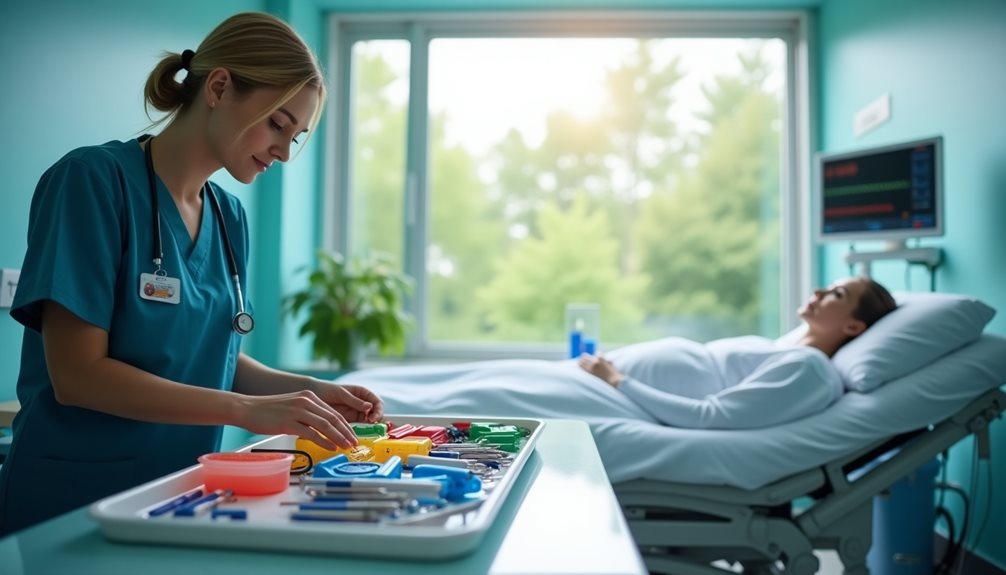Table of Contents
ToggleBasic Medical Vocabulary

Basic medical vocabulary in Russian is fundamental for effective communication within the healthcare system. Understanding specific terms related to body systems enables healthcare professionals to convey critical information accurately.
For instance, terminology concerning the cardiovascular (сердечно-сосудистая система [serdéchno-sosudístaya sístema]), respiratory (дыхательная система [dykhatélnaya sístema]), and nervous (нервная система [nérvnaya sístema]) systems is essential for diagnoses and treatments. Familiarity with medical abbreviations further enhances clarity; for example, “ЭКГ” (EKG, электрокардиограмма [elektrokardiográmma]) denotes electrocardiogram, a crucial tool in cardiac assessment.
Additionally, knowledge of terms related to anatomy (анатомия [anatómia]), physiology (физиология [fiziológiya]), and common procedures facilitates better patient interactions and education. This specialized vocabulary empowers individuals to navigate the healthcare landscape confidently, ensuring they can advocate for their health and make informed decisions.
Mastery of basic medical terminology in Russian (русский язык [russ-kee yazyk]) ultimately fosters greater independence and understanding in medical contexts.
Common Symptoms and Conditions
Furthermore, awareness of these common ailments encourages proactive health measures, empowering individuals to seek assistance when necessary and promoting overall well-being.
A solid grasp of medical vocabulary allows for a more nuanced understanding of common symptoms and conditions encountered in healthcare settings.
Fever symptoms, such as elevated body temperature, chills, and sweating, are often indicators of underlying infections or inflammatory processes. Identifying these symptoms is essential for timely diagnosis and treatment.
In addition, chronic conditions like диабет (diabet – diabetes), гипертония (gipertoniya – hypertension), and астма (astma – asthma) require ongoing management and an awareness of associated symptoms, including fatigue, dizziness, and shortness of breath. Understanding the terminology related to these symptoms enables patients and healthcare providers to communicate effectively, fostering better health outcomes.
Furthermore, awareness of these common ailments encourages proactive health measures, empowering individuals to seek assistance when necessary and promoting overall well-being.
![]()
| Russian (Cyrillic) | English Phonetic | English Definition |
|---|---|---|
| Лихорадка | Likhoradka | Fever |
| Повышенная температура | Povishennaya temperatura | Elevated body temperature |
| Озноб | Oznob | Chills |
| Потение | Poteniye | Sweating |
| Инфекция | Infektsiya | Infection |
| Воспаление | Vospaleniye | Inflammation |
| Диабет | Diabet | Diabetes |
| Гипертония | Gipertoniya | Hypertension (high blood pressure) |
| Астма | Astma | Asthma |
| Усталость | Ustalost’ | Fatigue |
| Головокружение | Golovokruzheniye | Dizziness |
| Одышка | Odyshka | Shortness of breath |
| Симптомы | Simptomy | Symptoms |
| Заболевание | Zabolevaniye | Condition / Disease |
| Диагноз | Diagnos | Diagnosis |
| Лечение | Lecheniye | Treatment |
This list covers the key Russian terms related to the medical vocabulary in the provided text.
Medical Professionals and Their Roles
Medical professionals play a critical role in the healthcare system, each contributing specialized knowledge and skills essential for patient care. Understanding the various doctor specialties helps clarify the functions within a medical team, ensuring thorough treatment plans and effective health management.
| Russian Term (Cyrillic) | English Phonetic | English Definition |
|---|---|---|
| Медицинские специалисты | Meditsinskiye spetsialisty | Medical professionals |
| Врач | Vrach | Doctor |
| Терапевт | Terapevt | General practitioner (primary care doctor) |
| Хирург | Khirurg | Surgeon |
| Педиатр | Pediatr | Pediatrician (children’s doctor) |
| Кардиолог | Kardiolog | Cardiologist (heart doctor) |
| Онколог | Onkolog | Oncologist (cancer specialist) |
| Здоровье | Zdorovye | Health |
| Заболевание | Zabolevaniye | Illness, disease |
| Операция | Operatsiya | Surgery, operation |
| Лечение | Lecheniye | Treatment |
| Пациент | Patsiyent | Patient |
| Команда врачей | Komanda vrachey | Medical team |
This table includes the main terms related to medical professionals and their roles as presented in the text.
These professionals collaborate to address diverse health needs, highlighting the importance of teamwork in achieving ideal patient outcomes.
Diagnostic Procedures
Diagnostic procedures serve as essential tools in the healthcare landscape, allowing for the accurate identification of medical conditions. Among the most common approaches, ultrasound examinations (ультразвуковые исследования) provide real-time imaging of internal organs, facilitating the detection of abnormalities without invasive techniques. This method is particularly valuable in obstetrics (акушерство) and abdominal assessments.
Blood tests (анализы крови), another cornerstone of diagnostics, analyze biochemical markers and cell counts, offering insights into a patient’s overall health and aiding in the diagnosis of various diseases. Both ultrasound examinations (ультразвуковые исследования) and blood tests (анализы крови) empower healthcare providers to make informed decisions, ensuring timely and effective patient care.
Mastery of these diagnostic tools (диагностические инструменты) is vital for medical professionals, enhancing their ability to deliver precise evaluations and tailored healthcare solutions.
| Russian Term (Cyrillic) | English Phonetic | English Definition |
|---|---|---|
| Диагностические процедуры | Dee-ahg-no-stee-CHEH-skee proh-TSYEH-doo-ry | Diagnostic procedures |
| Ультразвуковое исследование | OOL-trah-ZVOO-kah-vah-yeh ee-slye-DOV-ah-nee-ye | Ultrasound examination |
| Внутренние органы | VNOOT-ryeh-nee-yeh OR-gah-nee | Internal organs |
| Аномалии | Ah-no-MAH-lee | Abnormalities |
| Обследование | Ob-slye-DAH-nee-yeh | Examination |
| Акушерство | Ah-KOO-shyer-stvo | Obstetrics (pregnancy care) |
| Абдоминальное обследование | Ab-dee-NAHL-nah-yeh ob-slye-DAH-nee-yeh | Abdominal examination |
| Анализ крови | Ah-NAH-lees KROH-vee | Blood test |
| Биохимические маркеры | Bee-oh-KHEE-mee-chehs-kee MAR-keh-ri | Biochemical markers |
| Подсчет клеток | Pod-SCHYOT KLYEH-tok | Cell counts |
| Общее состояние здоровья | OB-shee-yeh sah-SHTAH-nyeh ZDOR-ohv-yah | Overall health condition |
| Диагностика заболеваний | Dee-ahg-NOS-tee-kah zah-bee-VAH-nee | Diagnosis of diseases |
| Медицинские работники | Mee-dee-TSEEN-skee rah-boht-NEE-kee | Medical professionals |
| Точный | TOCH-nee | Precise |
| Оценка | OHT-syen-kah | Evaluation |
| Индивидуальное лечение | Een-dee-VEE-doo-al-nah-yeh LYEH-cheh-nye | Tailored healthcare/treatment |
Treatment Options and Medications
Numerous treatment options (варианты лечения) and medications (лекарства) are available to address a wide range of medical conditions, tailoring interventions to individual patient needs. Treatment effectiveness (эффективность лечения) varies considerably depending on the condition, patient demographics, and adherence to prescribed regimens.
Common modalities (методы) include pharmacological therapies (фармакологические терапии), physical rehabilitation (физическая реабилитация), and complementary approaches, each designed to optimize recovery and enhance quality of life.
Medications (лекарства), while often vital for managing symptoms or curing illnesses, can also present medication side effects (побочные эффекты лекарств) that must be closely monitored. It is essential for healthcare providers to educate patients on potential adverse reactions and to adjust treatment plans accordingly.
Ultimately, the goal remains to achieve the most favorable outcomes while minimizing risks associated with both treatments and medications.
| Russian Term (Cyrillic) | English Phonetic | English Definition |
|---|---|---|
| Лечение | Lecheniye | Treatment |
| Медикаменты | Medikamenty | Medications |
| Варианты лечения | Varianty lecheniya | Treatment options |
| Медицинские состояния | Meditsinskiye sostoyaniya | Medical conditions |
| Пациент | Patsiyent | Patient |
| Эффективность лечения | Effektivnost’ lecheniya | Treatment effectiveness |
| Возраст пациента | Vozrast patsiyenta | Patient age/demographics |
| Соблюдение режима | Soblyudeniye rezhima | Adherence to regimen |
| Фармакологическая терапия | Farmakologicheskaya terapiya | Pharmacological therapy |
| Физическая реабилитация | Fizicheskaya reabilitatsiya | Physical rehabilitation |
| Комплементарные методы | Komplementarniye metody | Complementary approaches |
| Восстановление | Vosstanovleniye | Recovery |
| Качество жизни | Kachestvo zhizni | Quality of life |
| Симптомы | Simptomy | Symptoms |
| Побочные эффекты | Pobochniye effekty | Side effects |
| Медицинский работник | Meditsinskiy rabotnik | Healthcare provider |
| Образование пациентов | Obrazovaniye patsiyentov | Patient education |
| Неблагоприятные реакции | Neblagopriyatnye reaktsii | Adverse reactions |
| Корректировка плана лечения | Korrektirovka plana lecheniya | Treatment plan adjustment |
| Результаты лечения | Rezultaty lecheniya | Treatment outcomes |
| Минимизация рисков | Minimizatsiya riskov | Risk minimization |
Emergency Situations

Healthcare Emergency Response (Медицинский экстренный ответ)
In the domain of healthcare, recognizing and responding to emergency situations is paramount.
Effective emergency response hinges on the ability to assess a situation swiftly and apply appropriate first aid techniques.
Knowledge of essential medical vocabulary in Russian can empower individuals to communicate clearly during crises.
Terms such as “первичная помощь” (first aid) and “ситуация экстренной помощи” (emergency situation) are crucial in facilitating rapid intervention.
First responders must remain calm, ensuring that critical signs are monitored and that necessary actions, like CPR or wound care, are performed without delay.
Training in emergency response not only enhances individual preparedness but also fosters community resilience, enabling a more effective and organized approach to medical emergencies in diverse environments.
In healthcare, being able to recognize and respond quickly to emergencies is very important. When someone is in danger or seriously hurt, acting fast can save their life. For English speakers learning Russian, knowing the right words and phrases can help communicate clearly in these critical moments.
Understanding Emergency Situations (Понимание экстренных ситуаций)
An emergency situation in Russian is called ситуация экстренной помощи
- Pronunciation: seetoo-aht-see-ya eck-strohn-noy pom-oh-shee
- Meaning: A situation requiring urgent help.
When you see someone hurt or unwell, you need to quickly assess the situation or оценить ситуацию (aht-seen-eet seetoo-aht-see-yu), which means “to assess the situation.”
Essential First Aid Vocabulary (Основные слова для первой помощи)
Knowing key medical terms can make a big difference. Here are some important Russian phrases related to first aid and emergency response:
| Russian (Cyrillic) | English Phonetic | English Definition |
|---|---|---|
| первая помощь | per-vah-ya pom-oh-shch | first aid |
| ситуация экстренной помощи | seetoo-aht-see-ya eck-strohn-noy pom-oh-shee | emergency situation |
| пострадавший | pos-trah-dahv-shee | injured person |
| вызвать скорую помощь | vyz-vaht’ sko-roo-yu pom-oh-shch | call an ambulance |
| сердечно-легочная реанимация (СЛР) | ser-dyech-no leh-goch-naya ree-ah-nee-maht-see-ya | cardiopulmonary resuscitation (CPR) |
| рана | rah-nah | wound |
| кровотечение | krah-vah-cheh-nyeh | bleeding |
| остановить кровотечение | ah-stah-no-veet’ krah-vah-cheh-nyeh | stop bleeding |
| дыхание | dih-hah-nyeh | breathing |
| проверить пульс | pro-vee-ryeet’ pul’s | check pulse |
| помощь при удушье | pom-ohshch pree oo-doosh-yeh | choking aid |
![]()
Practical Tips for Emergency Response
- Stay calm — сохранять спокойствие (sah-khra-nyat’ spokoy-stvee-yeh)
Panicking makes it harder to help and communicate. - Call for help — позвонить за помощью (paz-vah-neet’ zah pom-oh-shchyu)
Always call emergency services quickly. - Check vital signs — проверить жизненные показатели (pro-vee-reet’ zhiz-nen-ny-ye pah-kah-zah-teh-lee)
Look at breathing, pulse, and consciousness. - Perform first aid — оказывать первую помощь (oh-kah-zih-vaht’ per-vu-yu pom-oh-shch)
Apply CPR, stop bleeding, or treat wounds as needed.
Learning these terms and concepts will help English speakers feel more confident when dealing with medical emergencies in Russian-speaking environments. This knowledge not only helps individuals but also supports the wider community by encouraging faster and clearer communication during critical situations.
Health Insurance and Medical Costs
Health insurance plays a critical role in managing medical costs, as it provides individuals with financial protection against unexpected healthcare expenses.
By offering coverage for a variety of medical services, health insurance mitigates the burden of high medical expenses that can arise from illnesses or accidents.
It facilitates access to necessary treatments while promoting preventive care, ultimately leading to better health outcomes.
Different plans vary regarding premiums, deductibles, and coverage limits, influencing how much individuals pay out-of-pocket.
Understanding the nuances of health insurance is essential for traversing the complex healthcare landscape.
Individuals must evaluate their options carefully to guarantee they select a plan that aligns with their needs and financial capabilities, fostering a sense of independence and security in their healthcare choices.
Patient Rights and Consent
Patient rights пациентские права (pah-tsyent-skee-ye prah-vah) and consent согласие (sog-lah-see-ye) constitute fundamental elements of ethical medical practice, ensuring that individuals maintain autonomy over their healthcare decisions.
Informed consent информированное согласие (een-for-mee-ROV-an-noye sog-LAH-see-ye) is a critical process that requires healthcare providers to deliver thorough information regarding treatment options, risks, and benefits.
This empowers patients to make educated choices about their health, reinforcing patient autonomy автономия пациента (ahv-toh-NOH-mee-ya pah-tsyen-TA).
A clear understanding of rights allows individuals to actively participate in their medical care, fostering trust between patients and providers.
Ensuring that consent is obtained without coercion is essential, as it respects the dignity and freedom of each patient.
Upholding these principles not only enhances the quality of care but also aligns with ethical standards, promoting a healthcare system that prioritizes individual rights and informed choice.
Useful Phrases for Healthcare Interactions
Effective communication is essential in healthcare settings, particularly when discussing patient rights and consent.
Utilizing useful phrases can greatly enhance healthcare communication, ensuring clear interactions between healthcare professionals and patients.
For patient education, phrases such as:
- “What symptoms are you experiencing?”
“Какие симптомы вы испытываете?” (Kakie simptomy vy ispytyvaete? - “Do you understand the treatment plan?”
“Вы понимаете план лечения?” (Vy ponimayete plan lecheniya?
Foster dialogue and comprehension and encourages patients to participate actively in their care.
These phrases empower patients, promoting informed decision-making.
Moreover, using culturally appropriate language can bridge gaps in understanding, enhancing trust.
Overall, mastering these essential phrases equips individuals with the necessary tools for effective interactions, reinforcing the importance of clear communication in healthcare environments.
| Russian (Cyrillic) | English Phonetic | English Definition |
|---|---|---|
| Здоровье | Zdorov’ye | Health |
| Врач | Vrach | Doctor |
| Пациент | Patsiyent | Patient |
| Медсестра | Medsestra | Nurse |
| Медицинская помощь | Meditsinskaya pomoshch’ | Medical care |
| Права пациента | Prava patsiyenta | Patient rights |
| Согласие | Soglasie | Consent |
| Информация | Informatsiya | Information |
| Симптомы | Simptomy | Symptoms |
| Диагноз | Diagnóz | Diagnosis |
| Лечение | Lechenie | Treatment |
| Аптека | Apteka | Pharmacy |
| Срочная помощь | Srochnaya pomoshch’ | Emergency help |
| Аллергия | Allergiya | Allergy |
| Рецепт | Retsept | Prescription |
| Осмотр | Osmotr | Medical examination |
| Вызов врача | Vyzov vracha | Call a doctor |
| Анализы | Analizy | Tests, analysis |
| Госпитализация | Gospitalizatsiya | Hospitalization |
| Медицинская карта | Meditsinskaya karta | Medical record |
| Заключение врача | Zaklyuchenie vracha | Doctor’s conclusion |
| Болезнь | Bolezn’ | Illness |
| Симптоматика | Simptomatika | Symptomatology |
This list provides key Russian terms that are useful for healthcare communication, especially around patient rights and consent.
Frequently Asked Questions
How Do I Find a English-Speaking Doctor?
To find a English-speaking doctor, one can start by searching for local clinics that advertise multilingual services.
Additionally, checking online directories may provide listings of healthcare professionals who speak English, enhancing accessibility for patients.
![]()
What Should I Bring to a Medical Appointment in Russia?
When attending a medical appointment in Russia, individuals should bring essential medical documents, including:
- Identification
- Insurance information
- Any relevant health records
This preparation guarantees a smooth and efficient consultation with the healthcare provider.
![]()
Are There Any Specific Cultural Practices in Russian Healthcare?
In Russian healthcare, traditional remedies often complement modern medicine.
Patient etiquette emphasizes respect and punctuality, with a strong belief in the significance of family involvement and communication between patients and healthcare providers during consultations.
![]()
How Can I Improve My Russian Medical Vocabulary?
To improve Russian medical vocabulary, one can utilize flashcard techniques for memorization and engage in interactive exercises to reinforce learning.
This approach fosters retention and understanding, essential for effective communication in specialized contexts.
![]()
What Resources Are Available for Learning Medical Russian Online?
Various resources exist for learning medical Russian online, including:
- Specialized online courses designed for medical professionals
- Interactive medical apps that enhance vocabulary retention
These offer a flexible approach to mastering terminology effectively and efficiently.



